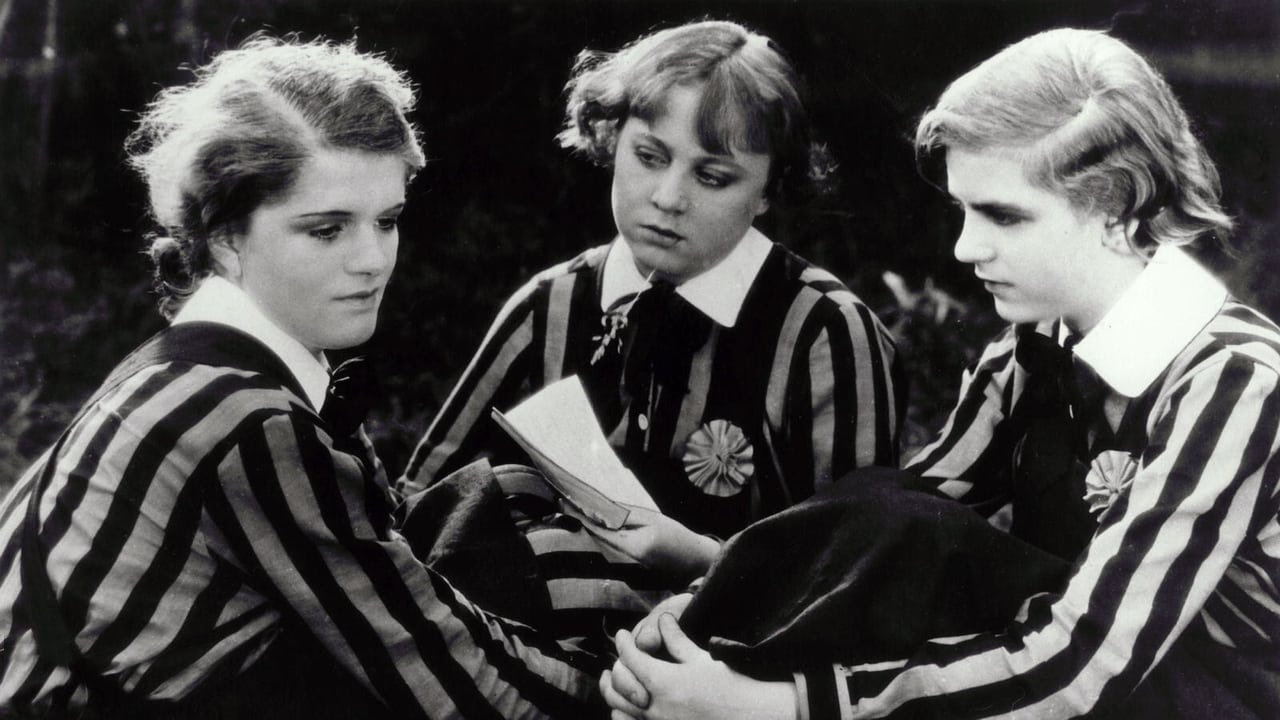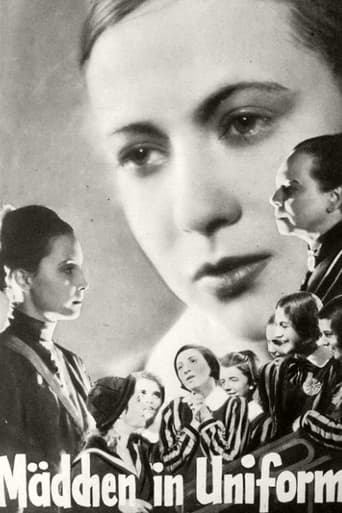

It's technologically pretty clever for 1931. Near the opening, just when the new girl is being shown around the boarding school, there is a scene of the girls' chorus enthusiastically singing a patriotic song, and the camera dollies in through the mob to one particular face. As it does so, the sound of her voice becomes louder and distinguishable from the others, so we can hear that she's shouting a corruption of the lyrics -- something about needing to eat.The careful meshing of images and sound wasn't standard for the time, except of course that Hitchcock had played around with it in early films like "Blackmail". But it's apparent that some effort was put into the direction. There's a nicely staged high angle shot of a five-story square staircase filled with chattering children moving upward as if on a frisky escalator.The new girl is fourteen-year-old Manuela von Meinhardis, whose mother had died when she was young and father serves in the military. After the other students welcome her, they warn her about falling in love with one of the teachers, the compassionate but mercurial Fräulein von Bernburg. Manuela then is promptly groomed and fitted with an ugly uniform with precise and ergonomic Gründlichkeit.This is some girls' school too. The rules are strict, somewhere between a convent and Marine Corps boot camp. You can't have money, candy or books of your own. You can't put a picture of a movie star on the inside of your locker door. Everything is presided over by a stern, homely Headmistress who reminds me of Miss Pavor DeGrone, my fifth grade arithmetic teacher. Try to imagine a scowling Erik von Stroheim in drag. "Through discipline and hunger we shall be great again." Now, this is 1931, so Hitler hadn't risen to the dazzling heights he would yet achieve, but it's also Prussia, home of the Junkers, land of the Spartans.At bed time, von Bernburg comes around to the dormitory and kisses each girl delicately on the head. The girls, hungry for affection as well as chocolate, await their turns ecstatically. But when it's Manuela's turn she throws herself into the teacher's arms and they kiss on the lips, which introduces a note into the relationship that's only been hinted at before, although the note is minor. In a later scene, von Bernburg gives Manuela a new petticoat and the impression is conveyed that the teacher is especially fond of Manuela but that Manuela's affection goes rather deeper than that. Well, after all, Manuela is at an age where, as the headmistress puts it, "their emotions are aroused." Any doubt about Manuela's physical development is put to rest in a scene in which she wears tights as part of a costume for Schiller's play, "Don Carlos." She's pretty nicely filled out, even if she's illegal. Schiller wrote the play around 1785. I had to read his work in a German class and he's pretty good, even amusing at times. It's Schiller's words that are sung by the chorus in Beethoven's Ninth Symphony, some of the noblest music extant.During a post-play celebration, an alcoholic punch is passed around and Manuela, happy beyond imagining because she was successful as the principal player and because she believes von Bernburg loves her, gets drunk and shouts out some opinions that find their way to the ears of Miss DeGrone, I mean the headmistress. Manuela and von Bernburg are forbidden to speak to one another again and Manuela's classmates are ordered to shun her. This leaves Manuela pretty down in the dumps. I'll leave it at that.I suppose it was surprising in 1931 to find a film dealing with what everyone since appears to have called "lesbianism," but it's really a story about the need to leaven discipline with understanding and mercy. Anyway, it's not really surprising that the teen-aged girls should develop crushes on an authority figure or on each other, even if it leads to some sexual experimentation.This is the kind of school that sociologists call a total institution in which everything is controlled and people of the same sex are forced to spend time together. If this is as bad as it gets in a Prussian girls boarding school, any state prison in American has it beat by a mile.
... View More"Maedchen in Uniform" (German, 1931): I viewed this film in an "unrestored" version, yet I was still fascinated by it on a number of levels. The photography was wonderful with well thought out set shots full of light and dark diagonal patterns illustrating late Expressionism/early Art Deco, and close ups of the girls and women using equally beautiful lighting, often with soft focus filters. A little knowledge of Euro/German history was helpful since this movie was banned in Germany (just prior to Hitler's coming into full power), and there is a lesbian angle to the story. (Yet, having lived in Europe, I was NOT prone to assigning every hand-holding, dance, or goodnight kiss to lesbianism.) The Prussian attitudes were represented by the older women still in power, and the "new" German attitudes were given to the young girls, the "hope" of the future. Germany couldn't have been in much more turmoil at the time, and was cranking up towards the war to make up for the last war, fascism, racial purification, intolerance, and an even deeper sense of conformity. This film is loaded with the era's "issues", and not necessarily supportive of where Germany was headed.
... View MoreGirls in Uniform is a feminist classic.This film is one of the hidden themes of early German cinema. For a movie that was made in 1931 the structure was very good. Light is used to indicate the repression of the girls. The girls were in a world full of darkness by the authorities of the boarding school. The interesting thing was that the main focus was on the relationship between Manuela and her teacher, there were other relationships too but they ware not the main focus. My feeling is that none of those girls were happy in that school but they learned to handle the situation and simply to live with it.
... View MoreThe experience of watching Madchen in Uniform left me feeling that that I had missed part of the film's message because of both the subtitles and the historical context. On the surface the movie seemed to simply be about a girl who after being forced to go to boarding school falls in love with her teacher and doesn't know how to handle herself. What is lost in the translation to English though are many of the messages that were quite revolutionary for the time and place that the movie was made. The film actually reflects the pre-Nazi German society, especially the places of both women and homosexuality. This was hard to follow in the subtitles which, showing the movie's age, were often missing or very hard to read. I found the movie rather unentertaining to watch; however, I feel that if I had known more about the time period and place that it was coming from before I viewed it then it might have had greater meaning to me. If the language and cultural barrier can be crossed, I feel the Madchen in Uniform achieves its point of addressing the social and political issues of Germany when it is observed with the correct historical context and openness in mind.
... View More